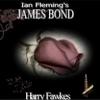Is it a good read?
#31

Posted 28 March 2011 - 07:29 PM
Obviously DMC has left a sour feeling for Bond fans and hopefully Deaver can remedy it.
#32

Posted 29 March 2011 - 09:40 AM
I remember when they announced Sebastian and some of the posters around here were freaking out at how awsome he is. I admit, I've never read any of his books prior and I'm not going to read any of them after. Talk about a bad impression.
It's really not at all representative of his other works. If they had gone down the route of labelling it Robert Markham, the odds on the true identity eventually being revealed as Mr Faulks would have been pretty long.
#33

Posted 30 March 2011 - 01:08 AM
It's really not at all representative of his other works.
Which is, sadly, the one big problem with it.
If they had gone down the route of labelling it Robert Markham, the odds on the true identity eventually being revealed as Mr Faulks would have been pretty long.
Very true. Not that Faulks has a signature style (BIRDSONG is written in a strikingly different "voice" to ENGLEBY, and one certainly wouldn't peg those two books as necessarily the work of the same man), but he usually brings a high standard of penmanship to the table, as well as fascinating content, both of which are almost entirely absent from DEVIL MAY CARE.
But I suppose it's an achievement of course that Faulks is evidently so versatile a writer that he's capable of penning a book that's a million miles away from his usual level of brilliance - not so much "WRITING AS Ian Fleming" but "WRITING AS Some Anonymous Hack". Rather like Bertolucci DIRECTING AS Michael Winner, or Jimi Hendrix PLAYING AS The Bloke in the Local Pub Band.
#34

Posted 30 March 2011 - 01:09 AM
Oh, he talks about DMC, eh? Maybe I need to get that. Thanks.In his recent publication Faulks on Fiction, Mr Faulks demonstrates evident regard for Fleming and his style/attitudes, and makes a number of points about what he, Mr Faulks, was seeking to achieve in writing Devil May Care. In the absence of much else publicly available from the various authors about their approaches, it's at the very least an interesting passing read. The vibe I get from the Bond chapter is that he seems to accept it didn't quite come off.
#35

Posted 30 March 2011 - 09:15 AM
Oh, he talks about DMC, eh? Maybe I need to get that. Thanks.
In his recent publication Faulks on Fiction, Mr Faulks demonstrates evident regard for Fleming and his style/attitudes, and makes a number of points about what he, Mr Faulks, was seeking to achieve in writing Devil May Care. In the absence of much else publicly available from the various authors about their approaches, it's at the very least an interesting passing read. The vibe I get from the Bond chapter is that he seems to accept it didn't quite come off.
Yes; a lot of this chapter of his "novel people" is not so much about Bond (classed as a "snob" rather than a "hero") - probably because he is such a popular character - but about Mr Faulks' approach to writing him.
I suspect you'd enjoy the book as a whole - some interesting pieces about some well-known, and not so well-known, literary characters. Albeit the chapter on Sherlock Holmes seems a bit trite, so that might annoy you.
#36

Posted 30 March 2011 - 09:35 PM
To take one small example, it's somehow grating to hear May refer to her employer as "Mr Bond" - if memory serves, doesn't she call him either "Mr James" or, occasionally, her own idiosyncratic, abbreviated version of "sir"? I know Fleming himself could be inconsistent with such details, but would little things like this have escaped the notice of a Bond-savvy proofreader?
Although I prefer to read about 007 in his original '50s-'60s timeframe rather than as some kind of updated neo-Bond with an amended backstory, the "irony of hindsight" approach here sometimes seems a bit forced.
And while, to be fair, Fleming did reuse the same basic characters and situations time and again, to have a Dr Julius Gorner when we've already had a Dr Julius No seems a bit too slapdash.
Fleming put so much of himself into the books that a Bond novel penned by anyone who doesn't share his particular tastes, fixations, fetishes and prejudices is bound to come across as comparatively hollow and lacking in re-readability, regardless of the level of literary skill brought to the table.
#37

Posted 03 April 2011 - 09:23 AM
Finally got round to reading DMC, with the benefit of pretty low expectations. Not as bad as I'd heard, but like the only other post-Fleming novel I've read, Colonel Sun, it seemed a bit "off".
To take one small example, it's somehow grating to hear May refer to her employer as "Mr Bond" - if memory serves, doesn't she call him either "Mr James" or, occasionally, her own idiosyncratic, abbreviated version of "sir"? I know Fleming himself could be inconsistent with such details, but would little things like this have escaped the notice of a Bond-savvy proofreader?
Although I prefer to read about 007 in his original '50s-'60s timeframe rather than as some kind of updated neo-Bond with an amended backstory, the "irony of hindsight" approach here sometimes seems a bit forced.
And while, to be fair, Fleming did reuse the same basic characters and situations time and again, to have a Dr Julius Gorner when we've already had a Dr Julius No seems a bit too slapdash.
Fleming put so much of himself into the books that a Bond novel penned by anyone who doesn't share his particular tastes, fixations, fetishes and prejudices is bound to come across as comparatively hollow and lacking in re-readability, regardless of the level of literary skill brought to the table.
Do you think that if the Author post Deaver is into a little bit of spanking it would help?
Joking aside, intresting post!
#38

Posted 19 May 2011 - 07:51 PM
#39

Posted 30 May 2011 - 04:49 PM
The novel isn't nearly as terrible as I remember (and I certainly understand a lot more of it now than I did then) but upon completion it did leave something of a bad taste in my mouth. Positives are hard to come by, though I credit Faulks with (reluctantly) signing on to what was essentially a doomed project from the start, and (in his own way) trying to make the best of it. IFP and Faulks decided to pick up where the beaten and emotionally distraught character from TMWTGG left off, now in the latter half of the 1960's and rapidly approaching (or has he eclipsed?) the 50 year mark in his life's pursuits. Bond is getting older, and Faulks attempts to explore that early on. This is the first major issue with the work. The ludicrous image of Bond rolling around in his Bentley observing the younger "hippie" generation immediately makes the character feel like an old man and somewhat out of place in his changing environment. Bond's attraction to this vehicle is part of the character, yes, but the feeling I got while reading was that this was a man whose formative years define him, and as a military agent surviving in an anti-military world, nostalgia is all he has to keep him sane. I admit to looking way more into this than I should, but I'm trying to give my views context before carrying on, and I would love to hear how everyone else perceived this character's growth through the piece. Bond's edge has dulled, and he acknowledges it. Even those around him, including Moneypenny and M, are crafted by Faulks in such a manner that presents them looking at Bond with fading admiration and a slight sense of pity. This brings up my first big question for Devil May Care: Who would actually enjoy reading about an aging hero who is clearly broken and irrelevant in his environment, expressing pangs of self pity while constantly rejecting the things that once made him tick? It wouldn't be surprising if many readers put the book down early on, because this isn't the Bond we all want to be, nor the Bond that understands the world and observes it through his own well trained eyes. This is a man who has blinders on, only seeing what the world once was and not what the world is. This was not Bond. Then again, this may be the point.
The minute Bond is presented with the vague assignment of tracking down Dr. Julius Gorner (an operation Faulks does not even attempt to flesh out or give reasoning behind outside of giving the character something to do) his self doubt slowly begins to evaporate, fading into oblivion as the complexity (or in our case the lack thereof) of the job begins to pick up. Bond begins to turn back into the hero we once knew, though never quite becoming the flawed, yet cool and charismatic character Fleming crafted. Faulks seriously missed the mark with his drawing of Bond, but I also lay a fair amount of the blame on IFP for insisting that the author pick up where Fleming "left off." Even as he enters captivity in an underground base in the deserts of Iran (How was it constructed without anyone noticing, by the way? What's its power source? Oh forget it.) the character only roughly resembles Fleming's patriot, accepting the certainty of his demise and seeking to help his country to his last breath. The conclusion between Bond and Scarlett seems to be intended to redeem his status as a relevant hero during a turning point in cultural history. Unfortunately, it reads more like the conclusion to an English paper for a class Faulks really didn't want to take. You can just imagine seeing the spot where he placed his last period and then sighed in relief, a slight drip of saliva dropping onto the page as his pain was finally relieved. I don't even think he proofread this thing himself, he just saved it and emailed it to whoever gets these things first. Back to more practical matters, though.
Setting wise, it was advertised that Faulks had placed his book in the Middle East so as to provide relevance to our own times. This was not the case. Outside of a poorly realized Tehran (a city that Faulks could have changed on a whim without the story or the relevance changing one bit) Russia is presented in a curiously hackneyed fashion, tacked on at the end without properly exploring what it was like for Bond to be in the homeland of his lifelong enemy (though Faulks does attempt to do just that...with maybe three sentences). The ostentatious box ticking that many have complained about is a bit of a nuisance. There are some bits where Faulks really buzzes along with his own prose, avoiding references and shoehorned character traits, but on the whole there is some really ugly characterization and lazy writing going on here. Again, this is likely the result of the whole "Centennial Celebration," but really it could have been handled much more elegantly. Name dropping villains and characters from each of Fleming's stories got tiresome almost immidiately, and while I didn't mind seeing Mathis, Leiter was not needed, and existed purely as a joke. The supporting cast of characters was equally baffling, with Darius representing a diet Darko Kerim, and JD Silver existing for the sole purpose of a double cross that is never really explained, and just seems to be there for Faulks to say that there was in fact a twist. The reveal that Scarlett had no twin sister, and was just her playing two parts was equally absurd, as were her steadfast attempts to sell it to Bond. The fact that Faulks had her go and sit in a different park in Russia for a few hours when she was supposed to be checking in at an embassy, all the while being followed by Gorner's henchmen, was just a ridiculous concept by Faulks, and it probably should have been dropped altogether. Her conversation with Bond at the end, where she admits to all of her lies was the sort of thing where I could actually picture Faulks writing it, and getting annoyed with himself for the amount of plot holes he was opening, then deciding the hell with it, the audience won't care, and carrying on. Gorner was Drax rehash and Chagrin a diet Odd Job, with no traits between them really worth discussing.
Through all of this, though, I oddly did not hate it. The plot made no sense, the characters were too weak for me to care about, but I kept on reading without much trouble. Faulks' prose style was not that bad. His descriptions were occasionally quite engaging, and made up for a few very bizarre sentences that peppered the work here and there. The dialogue wasn't a chore to get through, but it was unusual for him to write Bond as the sort of guy who frequently mutters to himself when surrounded by bad guys. Why? Why did he think it was necessary to write "'Good girl, Scarlett,' Bond muttered to himself," when it added literally nothing to the situation or the character? Anyway, Devil May Care is an oddity in the canon. It represents a work that was poorly conceptualized, and seemingly halfheartedly realized. There are countless errors, but a curious character arc for Bond that I think is worth appreciating if only for its intent. I do think fans should give it a look, because when the mind is switched off and the words come and go between the eyes, DMC is a fairly enjoyable, utterly disposable spy romp. Is it a good novel? Not really. Is it a good Bond novel? No. Will it entertain? Probably. It's not a trainwreck, but it's not something worth visiting often.
#40

Posted 12 July 2011 - 05:19 PM
I must admit, I was truly disappointed with Deaver's take on Bond (from the first page tell you the truth) but I won't get into that here of course.
DMC on the other hand is a fine piece of work, I found myself thinking as I immersed myself into Faulk's take on the world of OO7.
Simply put I bloody loved it - again and after such a long time.
After Deaver's rather wooden and at times cold and dispassionate affair(in my most humble opinion of course), reading Devil May Care felt like revisiting an old, trusted friend (sounds corny that, eh
Anyway, contrary to what most members have written about DMC on this thread I believe its as good as any of the best of the Bond novels out there (But that's not to say there aren't any bad moments or particular 'things' in the novel that Faulks couldn't have done better of course, but I'm sure you agree that's even true in the best of the Fleming ones).
So, once again, two thumbs up for Sebastian Faulks and Devil May Care
HF
#41

Posted 13 July 2011 - 06:08 PM




